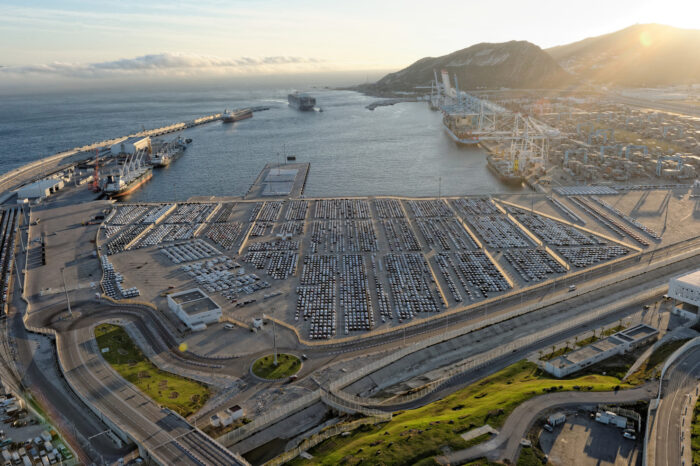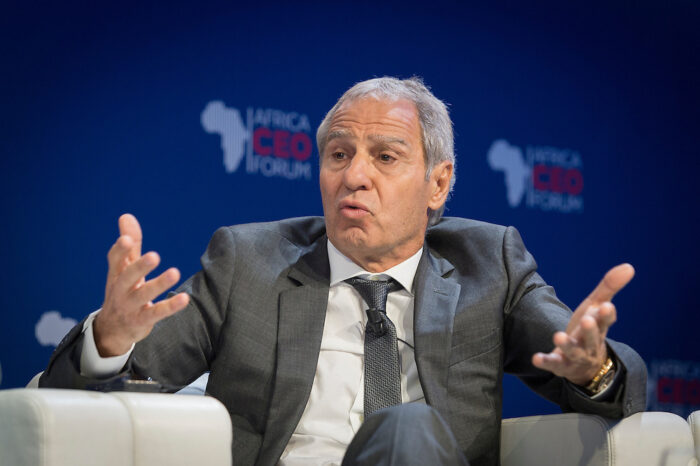The scene takes place on November 2nd at SOMAGEC’s headquarters, in a modest room where a row of multicolored surfboards can be seen. The group’s president, Roger Sahyoun, contrary to his usual habits, agrees to pose for a family photo. Surrounded by his future « business partners, » he forces a nearly reluctant smile.
The man is not a fan of media attention. For nearly five decades, he has carefully avoided the harsh glare of the spotlight. But that day, the contract he secured was tripartite, and the rules of engagement called for at least a minimal level of exposure.
In partnership with Dubai giant Ducab, a leader in energy solutions in the United Arab Emirates, SOMAGEC’s CEO secured a dazzling contract to build « more than 400 kilometers of 220 kV transmission lines to help electrify Angola, » according to the official statement.
SOMAGEC will lay the transmission lines, and Ducab will supply 2,000 kilometers of overhead transmission lines, « as well as high, medium, and low voltage cables for the Angolan energy sector. » The goal: to spread the energy produced by four Angolan hydroelectric plants to most of the country in less than two years.
But this deal, as impressive as it may seem, is just the latest in a long list of projects that SOMAGEC has accumulated over half a century. Dakhla Atlantique, the Marchica lagoon, numerous marinas… SOMAGEC has been involved in all the major infrastructure projects of the Mohammed VI era.
Neck and neck with SGTM, its counterpart—sometimes rival, sometimes partner on various projects—SOMAGEC has managed to upgrade its capabilities, offering Morocco the luxury of entrusting strategic contracts to a national player rather than a foreign one.

Roger the African
Behind this rise is one man, Roger Sahyoun. Little known to the general public, he stood out during King Mohammed VI’s African tours. A seasoned expert on the continent, where he was an early pioneer, Sahyoun capitalized on his networks to benefit Morocco’s brand.
By the early 2000s, Sahyoun had already established a presence in Equatorial Guinea, where his close ties with the controversial president Teodoro Obiang Nguema Mbasogo opened the door to numerous projects, including the construction of Bata’s drinking water network, the ports of Kogo and Malabo, and the runway at Annobon airport, among others. Through his subsidiary SOMAGEC GE, founded in 2005, Sahyoun employed up to 2,500 workers in Equatorial Guinea.
“He had the foresight to look beyond our borders before anyone else, even while dominating in Morocco”
In 2009, he told Jeune Afrique that his goal in Morocco, unlike in sub-Saharan Africa, was « not to generate numbers just for the sake of it, but to focus on targeted, preferably technical projects. »
At the time, SOMAGEC’s business volume in Equatorial Guinea had already surpassed one billion euros, compared to 150 million euros in Morocco. It’s worth noting that Sahyoun’s African ventures preceded the increased interest that large national companies would show in the continent during the 2010s, driven by royal initiatives. A highly regarded advisor to Senegalese President Abdoulaye Wade, Sahyoun secured the contract for the extension of Dakar’s port in 2006.
« He had the foresight to look beyond our borders before anyone else, even while dominating in Morocco, » remarked a Moroccan construction industry operator. Indeed, SOMAGEC’s proven expertise in port and maritime installations quickly made it a key player. By the time it began its first African projects, it was already involved in most of the kingdom’s port infrastructures: the Bouregreg Valley, Casablanca Marina, Tanger Med. For this passionate coastal enthusiast, who could spend hours discussing the sea and whose family shares a love for surfing, building lasting infrastructures is a matter of patriotism.
« You’ll never hear him talk about money or his desire to compete for this or that contract, » shared one of his close associates. « But once you bring up maritime geostrategy, the stakes of properly developing our Atlantic coastline, and the soft power it could grant Morocco, he becomes unstoppable, » the source added.
Interestingly, the group’s specialization in port and maritime infrastructure was born somewhat by chance. Initially founded by patriarch Rizkallah Sahyoun, Roger’s father, SOMAGEC was far from what would become its core mission.
From Palestine to Casablanca
It all began when the Sahyoun family settled in Casablanca in the 1920s. Roger’s father was only six months old at the time. In 1967, he founded the « Société Maghrébine de Génie Civil » (SOMAGEC). Rizkallah Riad Sahyoun, a Christian Palestinian, was both a visionary and a tireless worker. In 2010, he told journalist Christelle Marot that he had « never taken a day off in twenty years. » As the family patriarch, he involved his relatives in managing the business, swearing that he would « never take the company public. »
The business did well in its early years, but it reached a new dimension when Rizkallah’s son, Roger, returned from France in 1972. An engineer and graduate of the École Spéciale des Travaux Publics, Roger Sahyoun made a strategic shift, focusing the family business on major port and maritime infrastructure. At the time, Morocco relied on foreign companies to build basic infrastructure.

With SOMAGEC’s rise in power, the kingdom can now rely on a national civil engineering player capable of getting the job done. Roger Sahyoun started with his first public contracts, but it was when he secured the redevelopment of the Casablanca port docks that the business really took off. This led to a prosperous period in which the company landed increasingly significant contracts, positioning itself at the heart of the country’s development initiatives.
Moreover, the company managed to unite a versatile and immediately operational workforce. Engineers, technicians, laborers, sailors, professional divers… depending on the nature of the project, SOMAGEC mobilizes a multidisciplinary team, allowing it to deliver turnkey projects, operate on multiple sites simultaneously, and continue building an already impressive track record.
A non-exhaustive list of its most notable achievements: Tanger Med 1 and 2, the marinas of Tangier, Casablanca, Agadir, and Saidia; the Tangier Ville cruise port, Casablanca shipyard, Ksar Sghir military port, the development of the Marchica lagoon, as well as all marine outfalls in Morocco.
Sahyoun’s unwavering ambition and his diversification beyond maritime projects into the construction of roads, wind farms, bridges, and civil, industrial, sanitary, and electromechanical engineering works earned him a Wissam presented by the King in 1999.
African Challenges
Having acquired solid expertise in complex projects, SOMAGEC is increasingly establishing a strong presence beyond Morocco’s borders. A prime example is the construction of the storage terminal at the Damerjog industrial park in Djibouti. The group is even active in Paraguay, where it has a subsidiary. However, SOMAGEC must contend with fierce competition, especially in Africa, where Chinese and European construction giants hold significant comparative advantages.
In a 2019 interview with Afrimag, Roger Sahyoun highlighted the intense rivalries in the continent’s markets: “From a purely technical perspective, SOMAGEC has nothing to envy from any of its competitors in its field. For decades, we have been delivering complex projects, especially port-related ones, to international standards, and to the great satisfaction of our clients, especially in terms of staying on budget and meeting deadlines. However, financing has become a decisive factor for clients, if not an exclusive one in some cases. The Chinese and Western countries have the financial tools to support their national actors in exporting their expertise. Since 2000, we’ve seen European companies gradually retreat from Africa, giving way to invasive Chinese groups across all sectors.”
While Chinese companies offer comprehensive packages, including full project financing through concessional loans, Moroccan groups operating in Africa must contend with the Achilles’ heel of financing. “Despite the presence of Moroccan banks in many African countries, financing is subject to local conditions, and the banks do not prioritize national operators,” said a former CEO of a Moroccan bank subsidiary in Côte d’Ivoire. Nonetheless, Roger Sahyoun remains determined to engage south of the Sahara.
The recent royal announcement of the creation of an Africa-centered economic hub along the Atlantic coast hints at lucrative opportunities for SOMAGEC, which, alongside SGTM, was awarded the contract for the Dakhla Atlantique commercial port, a project valued at $12.5 billion.
SOMAGEC’s central role in the national infrastructure ecosystem was further solidified by the recent Sebou and Bouregreg basin interconnection project. This massive 6-billion-dirham undertaking, diverting excess water from the Sebou basin to supply the Rabat-Casablanca corridor and its 12 million consumers, was completed in less than nine months.
“A feat,” described a hydraulic engineer involved in the project. Delivered in August 2023, the interconnection showcased the expertise of national civil engineering actors, including SOMAGEC, once again alongside SGTM and STAM-SNCE.
Fiercely protective of his privacy, Sahyoun, whose personal fortune would earn him a respectable spot on the African Forbes ranking, has chosen the path of discretion. Leading a group with assets exceeding 2 billion dirhams, he remains a fan of simple pleasures.
The man who worships the sea and its waves, much like his son Jérôme, a big-wave surfing enthusiast, is more likely to be found enjoying a sardine tagine with his grandchildren at a spot on the Atlantic coast than in one of the social salons of the economic capital. His avoidance of the spotlight has served him well so far.
Written in French by Réda Dalil, edited in English by Eric Nielson



